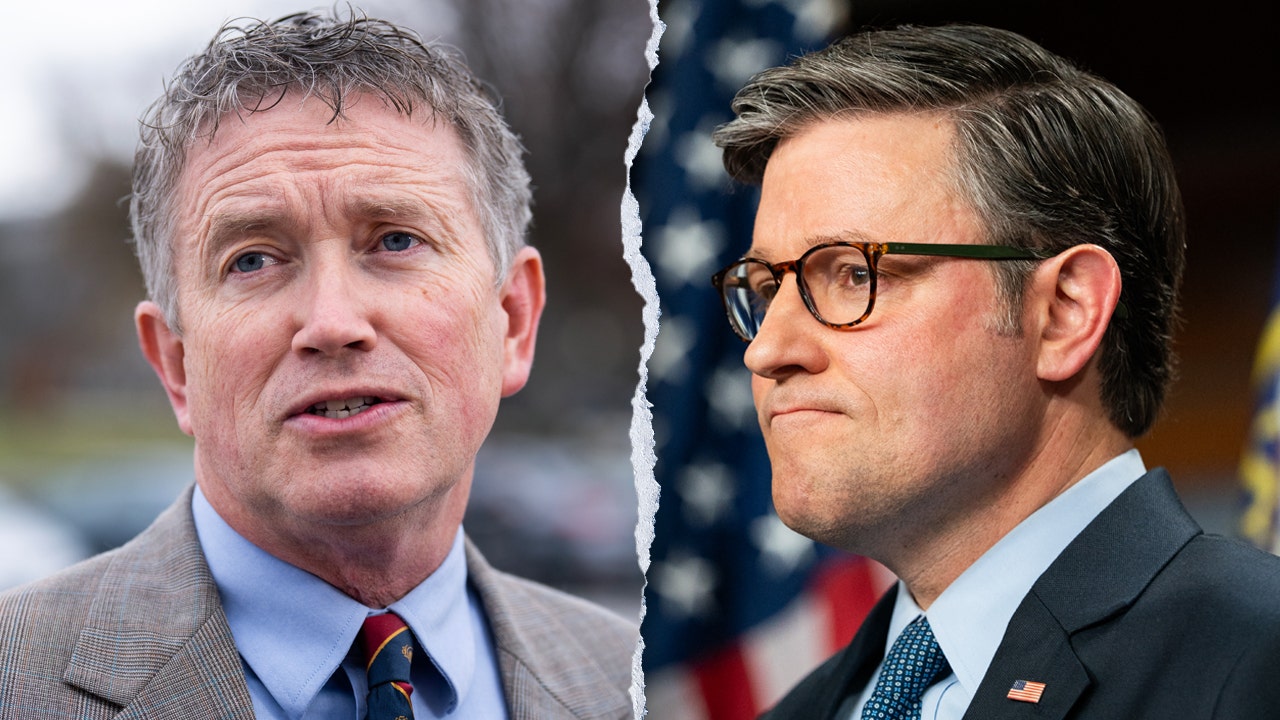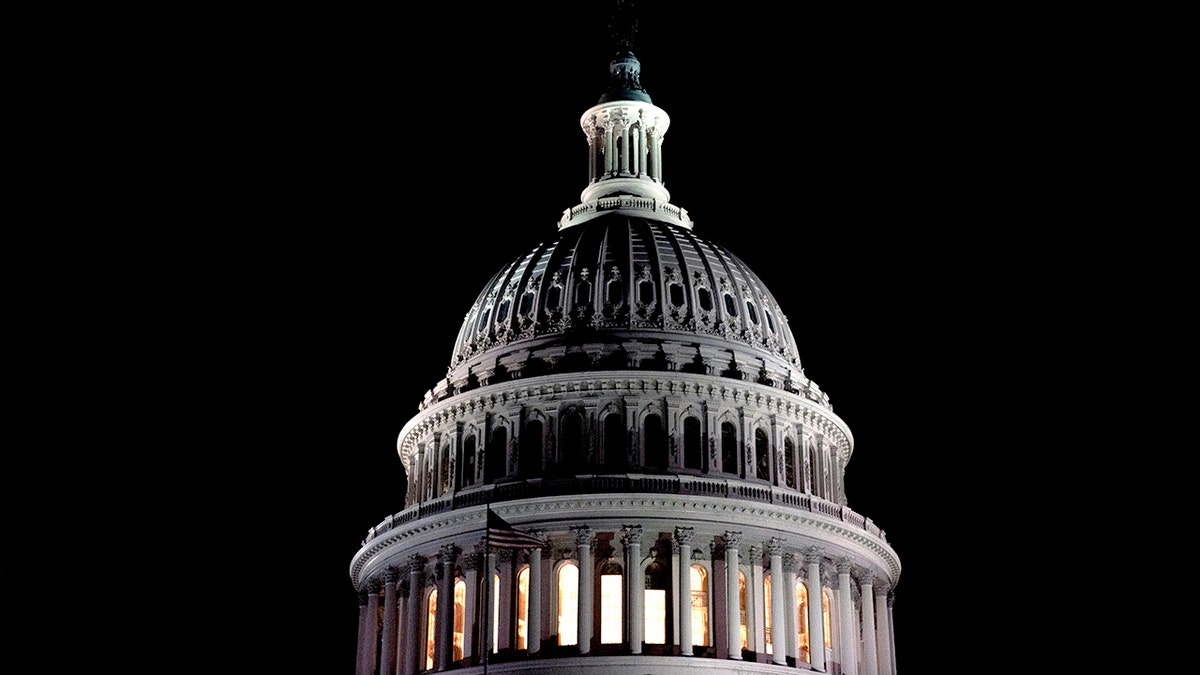Politics
Video: U.S. ‘Fully’ Supports Sweden’s Bid to Join NATO, Biden Says

new video loaded: U.S. ‘Fully’ Supports Sweden’s Bid to Join NATO, Biden Says
transcript
transcript
U.S. ‘Fully’ Supports Sweden’s Bid to Join NATO, Biden Says
President Recep Tayyip Erdogan of Turkey has blocked Sweden’s NATO membership bid.
-
“I want to reiterate the United States fully, fully, fully supports Sweden’s membership in NATO. And the bottom line is simple: Sweden is going to make our alliance stronger, and has the same value set that we have in NATO. And I’m really looking — anxiously looking forward — for your membership.” “We highly appreciate your strong support for Sweden’s NATO accession. That means a lot to us. We we do seek common protection, but we also do think that we have things to contribute with, to be a security provider for the whole of NATO.”
Recent episodes in U.S.

Politics
Massie comes out against Johnson retaining speaker's gavel: 'He does not have my vote'

Rep. Thomas Massie, R-Ky., has declared that he will not vote for House Speaker Mike Johnson to retain the speakership next year.
“He does not have my vote,” Massie told CNN’s Manu Raju. Asked whether he would change his mind, Massie said that would require “a Christmas miracle.”
Earlier this year Massie supported Rep. Marjorie Taylor Greene in pushing to remove Johnson from the speakership, but the vast majority of members in both parties ultimately voted to spike the ouster effort.
JOHNSON HIT WITH POSSIBLE SPEAKERSHIP RIVALS AS CONSERVATIVES REBEL OVER GOVERNMENT FUNDING PLAN
“It’s a new paradigm in Congress. Nancy Pelosi, and most republicans voted to keep Uniparty Speaker Mike Johnson,” Massie tweeted at the time.
This week Johnson had advocated in favor of a more than 1,500-page government spending measure that would have averted the looming prospect of a partial government shutdown.
During a Wednesday interview on “Fox & Friends” Johnson said that the spending measure would kick the government funding issue until March when Republicans will have control of Congress and the White House, enabling the GOP to “decide spending for 2025.”
The measure also included disaster relief funding as well as aid related to farmers.
“Disaster aid and Farm aid is not ‘Pork’. It’s called governing. That’s what we were all ELECTED to do,” Rep. Greg Murphy, R-N.C., declared in a post on X.
Left: Rep. Thomas Massie, R-Ky., is seen outside the U.S. Capitol on Wednesday, Dec. 18, 2024; Right: Speaker of the House Mike Johnson speaks to the press at the US Capitol in Washington, D.C., after the Republican Conference meeting on Dec. 17, 2024. (Left: Tom Williams/CQ-Roll Call, Inc via Getty Images; Right: ALLISON ROBBERT/AFP via Getty Images)
But conservatives savaged the proposal and Elon Musk spoke out against it.
President-elect Donald Trump and Vice President-elect JD Vance also weighed in. In a statement, they called for passage of “a streamlined spending bill that doesn’t give Chuck Schumer and the Democrats everything they want.”
“Republicans want to support our farmers, pay for disaster relief, and set our country up for success in 2025. The only way to do that is with a temporary funding bill WITHOUT DEMOCRAT GIVEAWAYS combined with an increase in the debt ceiling. Anything else is a betrayal of our country…” they said in the statement.
HOUSE GOP LEADERS SCRAMBLE FOR PLAN B AFTER TRUMP, MUSK LEAD CONSERVATIVE FURY AGAINST SPENDING BILL

Rep. Thomas Massie, R-Ky., speaks at a campaign event for Republican presidential candidate Florida Gov. Ron DeSantis at McDivot’s Indoor Sports Pub on Jan. 7, 2024, in Grimes, Iowa. (Anna Moneymaker/Getty Images)
Massie mocked Johnson this week by sharing an AI-generated image that depicted the speaker holding a hose while a house burned in the background.
He shared the image after declaring in a tweet that “US foreign aid spending is like watering the neighbor’s yard while your house is on fire.”
Politics
Transgender people working in U.S. government see peril under Trump

WASHINGTON — The Air Force lieutenant colonel left the Pentagon one day and returned the next — with a new name and a new gender identity.
Bree Fram remembers the atmosphere in 2020 as welcoming and supportive. Her colleagues brought cookies. When the Pentagon officially changed her gender in employment records, she felt her journey was complete.
Fram is one of thousands of transgender people working openly in government positions, including the Defense and State departments, intelligence agencies and various other federal branches. An estimated 15,000 transgender people work in the military alone. They say acceptance and support has surged in recent years.
But many are now worried that the broad advances they achieved over the last decade will be reversed under President-elect Donald Trump, who has likened gender transition to “mutilation,” vowed to roll back job protections and healthcare for trans workers and threatened to reimpose a ban against transgender people serving in the military.
Col. Bree Fram attends the Out100 Celebration at NeueHouse Hollywood on Dec. 11, 2024, in Hollywood.
(Amy Sussman / Getty Images)
“The mood among the community is apprehensive,” Fram said, noting she was speaking in her personal capacity and not on behalf of the Air Force.
Two transgender women in the State Department, who spoke openly with The Times earlier this year about their experiences, said after the election they no longer wanted to be identified out of fear for their safety and positions. One, a former Iraq combat veteran who transitioned later and landed at State, said she and friends now feared “becoming targets.”
Fram, a 21-year veteran of the Air Force and an aeronautical engineer whose job includes choosing the satellites that the U.S. launches into space, is a prominent activist in the transgender movement. She said transgender colleagues are stopping her in the hallways and bombarding her with questions and requests for advice.
“We have seen the campaign promises, the rhetoric being used about transgender people and what’s occurring on Capitol Hill as well,” she said. “So while none of us know exactly what will come to pass, there is still certainly that concern that it’s not going to be good for transgender people serving in the military.”
A group of Republican lawmakers is already attempting to bar incoming Rep. Sarah McBride (D-Del.), the first out transgender person elected to Congress, from using women’s restrooms. A leader in that group, Rep. Nancy Mace (R-S.C.), wants to extend bathroom bans in all federal facilities nationwide.

Rep.-elect Sarah McBride (D-Del.), center, leaves a meeting of House Democrats on Capitol Hill on Nov. 19, 2024.
(Mark Schiefelbein / Associated Press)
Fears grew with Trump’s nomination of a Fox TV host, Pete Hegseth, as secretary of Defense. Hegseth has been vocal in his belief in restrictions on women in the military and the removal of transgender service members.
In 2016, President Obama lifted a ban on transgender people serving in the military. Trump reinstated it when he reached office the following year, but it was largely held up in the courts until President Biden repealed the ban. Many expect Trump to attempt to reimpose it.
Bram said she was nevertheless confident her community would persevere.
“What always amazes me about this community is despite … the many, many times we have faced adversity, it’s the resilience of this group of amazing people,” she said. “These public servants, who continue to put on their uniform every day and accomplish the mission that they’ve been given.… They are there doing the job and plan to continue doing the job for as long as they’re allowed to do so.”

Sailors kiss as they march in the Gay Pride Parade in San Diego in 2011.
(Gregory Bull / Associated Press)
No one knows exactly how far the Trump administration will go, and its efforts will again undoubtedly meet legal challenges and other resistance.
“We have seen this movie before,” said Jennifer Pizer, the L.A.-based chief legal officer at Lambda Legal, a civil rights organization that focuses on LGBTQ+ issues. “This is a group of people who are flouting the standard rules … and looking forward to spending an indefinite time in court.”
There are several options Trump might pursue, she said.
In addition to reimposing a military ban, Trump loyalists might attempt to deny “gender affirming” healthcare, forbidding federal funds or insurance plans to be used in procedures that facilitate transition, including hormone therapy and plastic surgery.

U.S. Rep. Seth Moulton (D-Mass.), center without hat, marches in 2015 with members of OutVets, a group of gay military veterans, during the St. Patrick’s Day parade in Boston.
(Steven Senne / Associated Press)
Republicans have added a rider to the must-pass defense authorization bill, forbidding such care for minors. That would have an impact on the children of service members.
And already, numerous states ban such care for minors in the civilian realm, an issue currently being reviewed by the Supreme Court.
When he first enacted the military ban, Trump said having transgender people in the armed forces was expensive. A 2016 study by Rand concluded that transgender healthcare added less than 0.1% to the health budget.
At the State Department, numerous policies, as well as union rules, are in place to protect transgender and gay diplomats and employees. But such policies could be subject to new executive orders or reversals.
In the 1950s and ’60s, the State Department pursued a hunt for gay and lesbian employees, civil servants and diplomats known as the Lavender Scare. They were routinely dismissed; many who hung on had to work in the closet. Some of the black-balling continued into the 1990s.

People attend a rally on a Transgender Day of Visibility in March 2023 in Washington.
(Jacquelyn Martin / Associated Press)
At the same time, the military and other federal agencies have often become national testing grounds in matters of inclusion and diversity.
President Franklin Delano Roosevelt desegregated the Army after World War II. Later, women were given broader roles, including, now, in combat.
In 1993, President Clinton took a first step toward lifting the ban on gays and lesbians in the military — a ban that was ended entirely in 2011.
Today, the State Department has teams dedicated to advocating for LGBTQ+ rights abroad, through embassies and sometimes in countries where homosexuality is criminalized.
In 2011, Robyn McCutcheon, a diplomat, trained astronomer and Russia expert, became the first person to transition while posted at a U.S. Embassy, during her tenure overseas in Romania.
“It is our collective responsibility to ensure transgender persons can live full lives, without fear of harm,” Secretary of State Antony J. Blinken said just last month. “The United States is committed to fighting for a world that accepts and respects transgender, nonbinary, and gender nonconforming persons.”

Secretary of State Antony J. Blinken, pictured in September, said last month that “it is our collective responsibility to ensure transgender persons can live full lives, without fear of harm.”
(Heather Khalifa / Associated Press)
“Until then,” he said, “we proudly advocate to end transphobic discrimination, violence and homicide.”
It is not clear these programs would continue under Trump and his nominee for secretary of State, Sen. Marco Rubio (R-Fla.).
Logan Ireland, a Texas-born transgender man who is an officer with the Air Force Office of Special Investigations, counsels others in the transgender community who want to join the military, with an added urgency after the election.
“You’re on this mission for a reason,” he said he tells them. “Continue pressing forward with your journey to serve in uniform…. A ban is not in effect yet, and we will not know if, or how, it might take shape.”
Ireland, speaking from Hawaii where he is stationed, said the struggle thus far “has taught us how to fight, resilience, integrity. I have to remain positive.”
Rachel Levine is often described as the most senior transgender person in the U.S. government, the first Senate-confirmed official who is transgender. She is the assistant secretary of Health in the Department of Health and Human Services. She is a long-time public activist for trans rights, and served as a grand marshal in last year’s gay pride parade in Washington.

Department of Health and Human Services Assistant Secretary of Health Rachel Levine, center, speaks after having attended a roundtable on transgender health with Tatiana Williams, left, executive director of Transinclusive Group, and Arianna Inurritegui-Lint, founder of Arianna’s Center, in June 2022 in Miami.
(Wilfredo Lee / Associated Press)
Levine, 67, a former state secretary of health in Pennsylvania, had already transitioned when Biden nominated her to the HHS job. She overcame resistance from GOP senators, including Republican Rand Paul of Kentucky, who attacked her for her support for gender-affirming medical care and grilled her on whether transgender women should be allowed in women’s sports.
“There has been a lot of pushback against the broader LGBTQI+ community that has nothing to do with science and nothing to do with medicine,” she said. “And faced with that pushback, I find joy in my work. It makes me want to work more for health equity.”
Politics
The Hitchhiker’s Guide to what happened to the interim spending bill

The 1,547-page interim spending bill to avoid a government shutdown is effectively dead. House Speaker Mike Johnson (R-La.) has all but yanked the plan off the floor after President-elect Trump, Vice President-elect Vance and Elon Musk torched the package to avoid a government shutdown this weekend and fund the government through March 14.
Had House Republicans had the votes to pass the bill – without leaning too heavily on Democrats – Republicans may have been able to pass the bill late Wednesday afternoon before the intervention of Mssrs. Trump and Vance. But there was just too much grassroots pressure, sparked by Musk on X and elsewhere.
HOUSE GOP LEADERS SCRAMBLE FOR PLAN B AFTER TRUMP, MUSK LEAD CONSERVATIVE FURY AGAINST SPENDING BILL
The stopgap spending package proved unpopular due to its size, and various legislative ornaments festooned on the bill like a Christmas tree. Conservatives were expecting Johnson to handle the spending plan differently this year at the holidays. But it backfired. Badly.
It’s notable that Mr. Trump did not weigh in until the 11th hour. He also demanded a debt ceiling increase. That’s something which faced the President-elect in the first quarter of the year and threatened to derail any legislative agenda or potentially spook the markets.
Johnson’s decision to veer off course – despite touting the bill heartily on Fox this morning – underscores several things.
President-Elect Donald Trump reacts during his meeting with Prince William, Prince of Wales at the Embassy of the United Kingdoms Residence on December 7, 2024 in Paris, France. (Oleg Nikishin/Getty Images)
This is a sign of things to come once President-elect Trump is in office. And that could present problems for Johnson as he may be at the whim of decisions by the new President?
Why did Johnson pull the bill?
It was wildy unpopular with his rank and file. But it devolved further once Musk and the President-elect got infused themselves.
MATT GAETZ REPORT BY HOUSE ETHICS COMMITTEE TO BE RELEASED
In many respects, Johnson’s decision to pull the bill was all about January 3. That’s the day of the Speaker’s vote. With 434 members to start the new Congress, Johnson needs 218 votes. Otherwise, he lacks a majority and cannot become Speaker. The House must vote repeatedly – as it did in January 2023 – before electing former House Speaker Kevin McCarthy (R-Calif.) five days later in what was the longest Speaker’s race since the 1850s.
Johnson tried to salvage himself in the Speaker’s vote by adding emergency agriculture spending to the bill. But Johnson is now trying to salvage himself by coming up with a new bill.

Speaker of the House Mike Johnson (R-LA) listens during a news conference following the Republican conference meeting at the U.S. Capitol on January 17, 2024, in Washington, DC. (Kent Nishimura/Getty Images)
The irony is that Johnson did not want to create drama before Christmas with a spending package. But drama is exactly what he got in what quickly became the worst Congressional holiday standoff since the fiscal cliff in 2012 or a government shutdown threat in 2014.
So here’s the $64,000 Question: What play does Johnson call next?
Does he do a clean CR to fund the government with nothing attached? Is it a bill that just re-ups current funding coupled with disaster aid? Do they attach a debt ceiling suspension as President-elect Trump has requested?
RFK JR SET TO FACE ABORTION, VACCINE SCRUTINY IN SIT-DOWNS WITH SENATORS ON CAPITOL HILL
And then the biggest question of all: can ANYTHING pass at all? Especially without votes from the Democrats?
Johnson has a tranche of conservatives who won’t vote for any CR at all. Many of them would also not vote for a debt ceiling increase, either.
And even if there is a new bill, do conservatives insist on waiting three days to ponder that bill? That triggers a government shutdown right there.

The US Capitol in Washington, DC, on Monday, Nov. 11, 2024. (Stefani Reynolds/Bloomberg via Getty Images)
The deadline is 11:59:59 pm ET on Friday.
So this is going to require someone to pull a rabbit out of a hat.
President-elect Trump’s maneuver today is reminiscent of a similar move he made in December 2019, which sparked the longest government shutdown in history.
Then-Senate Majority Leader Mitch McConnell (R-Ky.), then-Appropriations Committee Chairman Richard Shelby (R-Ala.) and others thought they had a deal to fund the government and avoid a Christmas-time shutdown.
The Senate voted for the bill. Senators even sat in the back of the chamber and sang Christmas carols during the vote.
Mr. Trump then balked at the last minute. House Republicans followed suit. The government shut down for more than a month.
-

 Business1 week ago
Business1 week agoOpenAI's controversial Sora is finally launching today. Will it truly disrupt Hollywood?
-

 Politics6 days ago
Politics6 days agoCanadian premier threatens to cut off energy imports to US if Trump imposes tariff on country
-
/cdn.vox-cdn.com/uploads/chorus_asset/file/25782636/247422_ChatGPT_anniversary_CVirginia.jpg)
/cdn.vox-cdn.com/uploads/chorus_asset/file/25782636/247422_ChatGPT_anniversary_CVirginia.jpg) Technology1 week ago
Technology1 week agoInside the launch — and future — of ChatGPT
-
/cdn.vox-cdn.com/uploads/chorus_asset/file/25789444/1258459915.jpg)
/cdn.vox-cdn.com/uploads/chorus_asset/file/25789444/1258459915.jpg) Technology5 days ago
Technology5 days agoOpenAI cofounder Ilya Sutskever says the way AI is built is about to change
-

 Politics5 days ago
Politics5 days agoU.S. Supreme Court will decide if oil industry may sue to block California's zero-emissions goal
-
/cdn.vox-cdn.com/uploads/chorus_asset/file/25546252/STK169_Mark_Zuckerburg_CVIRGINIA_D.jpg)
/cdn.vox-cdn.com/uploads/chorus_asset/file/25546252/STK169_Mark_Zuckerburg_CVIRGINIA_D.jpg) Technology6 days ago
Technology6 days agoMeta asks the US government to block OpenAI’s switch to a for-profit
-

 Politics7 days ago
Politics7 days agoConservative group debuts major ad buy in key senators' states as 'soft appeal' for Hegseth, Gabbard, Patel
-

 Business4 days ago
Business4 days agoFreddie Freeman's World Series walk-off grand slam baseball sells at auction for $1.56 million

















